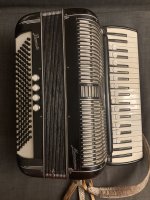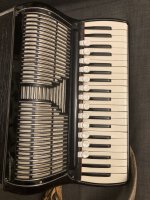Oliver F
Newbie
I recently picked up this old Marrinucci 120 bass piano accordion from a family friend who was getting rid of it(she estimates it is from the 40s). It plays okay, but there are a few issues that I would like to fix. I am very interested in accordion repair, have some experience with DIY, and have read through most of the accordion revival website meaning I feel comfortable working on it. However, I am not certain what steps to take.
- The first problem is that the bellows are leaking due to missing metal corner bits. Other than the corners the bellows seem to be sealed well. My first question is are the corners just squeezed in place and held by friction or is there some glue and if so what type of glue? Then would it be worth it to manufacture my own corners or should I buy them?
- The next problem is that only 2 of the treble side register keys are working and none of the bass side register keys are working. I have found little information online about fixing this and have not been able to diagnose a problem through my inspections. Does anyone know of common problems which could be affecting my register keys and how to fix them?
- Most of the accidental keys on the treble side make very little sound. Through my research, this seems like a problem of dust on the reeds. Is that an accurate conclusion or are there other issues to look out for causing the accidentals to make little sound?
- The bass buttons often stick down. I have looked at the bass machine and have not seen any bending leading me to think that the sticking is caused by dust or other impurities. If this is true then how should I go about cleaning the bass machine (I am intimidated by the prospect of disassembling the bass machine)?
- The accordion did not come with a case so I am building my own. In my research, I have seen information saying to store it in the orientation it will be played in however I have also seen more compelling information saying to store it on its feet on the bass side. Should I store it on its feet or in playing orientation?


